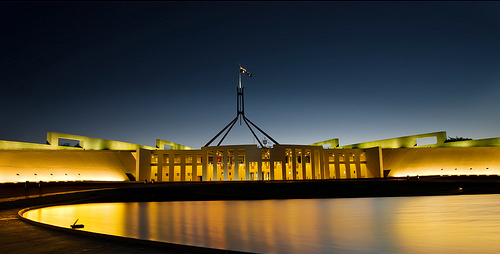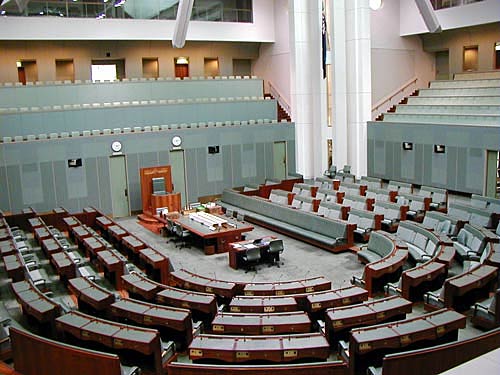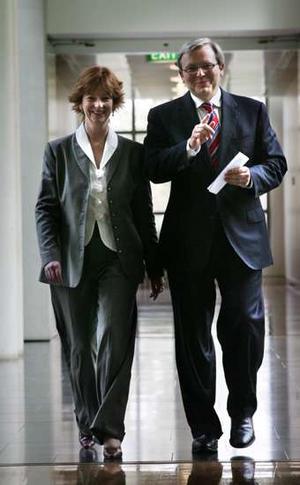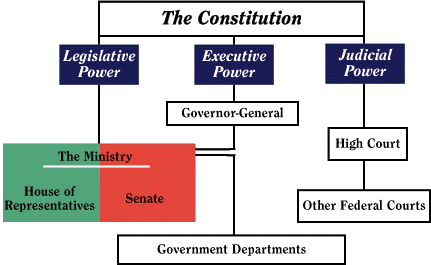
I generally avoid politics in my posts—not because I don’t have anything to say, but because I have a bit too much to say, much of which is not worth saying.
But many Australians have been shocked by the events in Canberra last week. These events have opened up a good opportunity for us to learn about our political system, and that’s good.
It seems many Australians assumed that our political system was primarily a populist one in which the people elect a President Prime Minister. I suspect this came from a) the movies and b) the historically recent Western mentality that “the people” have a moral right to run the country.
How does our government work?
While we as a nation have been deeply influenced by the American experiment as a Constitutional Republic, we are in fact a Constitutional Monarchy and Parliamentary Democracy.
The chart below is taken from here and lays out the structure of our form of government.
Our Parliament operates under the authority of the Constitution Act (s. 1) and is made up of the the House of Representatives, the Senate, and the Crown.
Who is the Prime Minister?
The popular notion of an elected Prime Minister is mistaken. The Prime Minister isn’t even directly represented in the chart above. While many countries vest the executive power in a President, in Australia it is vested both in the Crown and in The Ministry.
1) The Crown consists of the reigning monarch of Great Britain (Queen Elizabeth II at the moment) through her appointed Governor-General.
2) The Ministry consists of the Prime Minister and his personally selected Ministers (collectively known as “the front bench”).
How does one become the Prime Minister?
 If the Prime Minister is not elected by the people, how do we decide who will be the Prime Minister? And who do the people elect?
If the Prime Minister is not elected by the people, how do we decide who will be the Prime Minister? And who do the people elect?
At election time, the people of Australia elect Members of Parliament (MPs) under s. 24 of the Constitution Act.1 These MPs negotiate to form parties and alliances as they choose.
Usually the majority of this negotiation occurs before an election takes place so that the Australian people have a good idea of how things are likely to end up should they elect a particular combination of candidates. However, some of the negotiation routinely occurs after the election (such as forming coalitions, forming alliances with independent MPs, etc.).
Once the MPs have formed into parties, they then select their leaders (again, this is usually done long before the election, but does not need to be). Whichever party/coalition has enough elected members to form a government will then take power and whoever happens to be their leader at the time will become the Prime Minister and will select the Ministers and Cabinet to be appointed by the Crown.2
The response
It seems many Australians were taken off guard by last week’s events. One Christian minister said “[Rudd] was our Prime Minister and WAS elected by the Australian public into that role.” An American reporter described the events as a “coup d’état.”
Such irresponsible statements are foolish and ill-informed.
A democratically elected group of MPs selected a new leader. They had every right to do so and, in fact, every responsibility to do so if they believed it was in the best interests of the nation.
Was it in the best interests of the nation?
Believe it or not, I’m going to avoid giving my opinions about this here (but no guarantee that I won’t break down and do it in the comments!).
 I will clarify this though. Many cynics are suggesting that what has happened has been unhealthy because now a bunch of faceless faction leaders are in charge. This is simply not true.
I will clarify this though. Many cynics are suggesting that what has happened has been unhealthy because now a bunch of faceless faction leaders are in charge. This is simply not true.
The men who ousted Kevin Rudd are the same men who gave him the support he used to set up his government in the first place. In other words, they always had this power. For various reasons, they came to the conclusion that a new leader should be selected.
This system, far from being bad, is actually very good. Our Prime Minister is accountable not only to the people at election time, but also to the other elected Members every day.
In the United States, a president can run amok and the combined, bipartisan voice of both the Senate and the Congress is required before he can be removed. Here, accountability is real and sometimes—as Rudd discovered—swift.
Additionally, these “faceless” men are not unaccountable. They are men who are in turn accountable to their own party branches. They are men who, within the party, have garnered the respect and cooperation of the MPs we elected.
Conclusion
I am thankful to be part of a nation that has one of the strongest forms of government in the history of the world. It is a form of government that combines the stability of a monarchy, the protection of divided powers, the limitation of a Constitution, the leadership of a Prime Minister, the representation of a parliament, and the accountability of democracy.
Let us pray for those who walk the corridors of Parliament House as they seek to use their authority for the good governance of the nation.
1 I realise that in my attempt to make this post readily understandable, I have made many sweeping simplifications. For instance, the people also elect senators under s. 7 of the Constitution Act. Please point out any oversimplifications or errors of fact in the comment section.
2 Actually, all the ministers are “Ministers of the Crown” and are appointed by the Queen through the Governor-General. In practice, the Governor-General follows the Prime Minister’s recommended appointments. These appointments are often part of the negotiations within a coalition.
About Jason Harris
4 Comments
Comments are closed.



Good post, we all need to know a bit more about how our government is run.
It was hard not to feel “ripped off” when Rudd was relieved of his prime ministership. After all, people voted for the Labour party led by Kevin Rudd, not someone else. You are right about us being influenced by American politics and it was a good reminder of what our system is all about.
I don’t believe the Crown has, or should have any real power in our system. Even the Governor General is not actually appointed by the Queen, he or she is appointed by the Prime minister. The GG has no real power either, and should be done away with, in my opinion. The position of GG is purely ceremonial, or should be, and the party in power should be accountable to the nation, not an individual.
I thought this post was really good. Simple explanations work for me anyway! lol Thanks!! =)
well set out, you should write textbooks:)
leaving aside the blatant political machinations and motivations behind Rudd’s removal, the voters will not forget his deputy’s hands over many of his policies and policy backflips. the next election cannot come soon enough.
Very well explained Mr Harris.
It is simply an accident of our system that the leader of the country is the leader of the party who won the most seats in parliament.
In my humble opinion Mr Rudd got exactly what he deserved given the picture of his leadership style that is now emerging. It seems he was treated exactly as he treated his subordinates. (I have absolutely zero sympathy for him.)